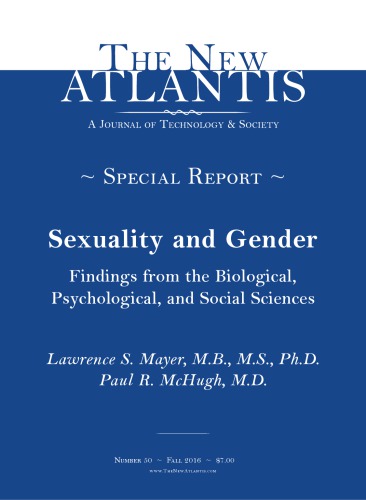(Ebook) Sexuality and Gender: Findings from the Biological, Psychological, and Social Sciences by Lawrence S. Mayer; Paul R. McHugh
This report presents a careful summary and an up-to-date explanation of research — from the biological, psychological, and social sciences — related to sexual orientation and gender identity. It is offered in the hope that such an exposition can contribute to our capacity as physicians, scientists, and citizens to address health issues faced by LGBT populations within our society.
Some key findings:
Part One: Sexual Orientation
● The understanding of sexual orientation as an innate, biologically fixed property of human beings — the idea that people are “born that way” — is not supported by scientific evidence.
● While there is evidence that biological factors such as genes and hormones are associated with sexual behaviors and attractions, there are no compelling causal biological explanations for human sexual orientation. While minor differences in the brain structures and brain activity between homosexual and heterosexual individuals have been identified by researchers, such neurobiological findings do not demonstrate whether these differences are innate or are the result of environmental and psychological factors.
● Longitudinal studies of adolescents suggest that sexual orientation may be quite fluid over the life course for some people, with one study estimating that as many as 80% of male adolescents who report same-sex attractions no longer do so as adults (although the extent to which this figure reflects actual changes in same-sex attractions and not just artifacts of the survey process has been contested by some researchers).
● Compared to heterosexuals, non-heterosexuals are about two to three times as likely to have experienced childhood sexual abuse.
Part Two: Sexuality, Mental Health Outcomes, and Social Stress
● Compared to the general population, non-heterosexual subpopulations are at an elevated risk for a variety of adverse health and mental health outcomes.
● Members of the non-heterosexual population are estimated to have about 1.5 times higher risk of experiencing anxiety disorders than members of the heterosexual population, as well as roughly double the risk of depression, 1.5 times the risk of substance abuse, and nearly 2.5 times the risk of suicide.
● Members of the transgender population are also at higher risk of a variety of mental health problems compared to members of the non-transgender population. Especially alarmingly, the rate of lifetime suicide attempts across all ages of transgender individuals is estimated at 41%, compared to under 5% in the overall U.S. population.
● There is evidence, albeit limited, that social stressors such as discrimination and stigma contribute to the elevated risk of poor mental health outcomes for non-heterosexual and transgender populations. More high-quality longitudinal studies are necessary for the “social stress model” to be a useful tool for understanding public health concerns.
Part Three: Gender Identity
● The hypothesis that gender identity is an innate, fixed property of human beings that is independent of biological sex — that a person might be “a man trapped in a woman’s body” or “a woman trapped in a man’s body” — is not supported by scientific evidence.
● According to a recent estimate, about 0.6% of U.S. adults identify as a gender that does not correspond to their biological sex.
● Studies comparing the brain structures of transgender and non-transgender individuals have demonstrated weak correlations between brain structure and cross-gender identification. These correlations do not provide any evidence for a neurobiological basis for cross-gender identification.
● Compared to the general population, adults who have undergone sex-reassignment surgery continue to have a higher risk of experiencing poor mental health outcomes. One study found that, compared to controls, sex-reassigned individuals were about 5 times more likely to attempt suicide and about 19 times more likely to die by suicide.
● Children are a special case when addressing transgender issues. Only a minority of children who experience cross-gender identification will continue to do so into adolescence or adulthood.
● There is little scientific evidence for the therapeutic value of interventions that delay puberty or modify the secondary sex characteristics of adolescents, although some children may have improved psychological well-being if they are encouraged and supported in their cross-gender identification. There is no evidence that all children who express gender-atypical thoughts or behavior should be encouraged to become transgender.
*Free conversion of into popular formats such as PDF, DOCX, DOC, AZW, EPUB, and MOBI after payment.


